By Peter Hossli (text) and Charly Kurz (photos)
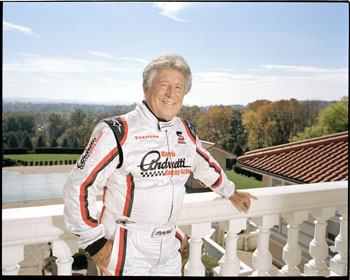
He was born in 1940 in the Italian town of Montona d’Istria, which is now part of Croatia. After World War II, his family lived in a refugee camp near Lucca before immigrating to the United States in 1955. They settled in Nazareth, Pennsylvania, two hours from New York, where he still lives today. It is there he met his Dee Ann, his wife of 46 years. She, a native of Nazareth, taught him English.
They have a daughter and two sons, one of whom, Michael, he has raced against in Indy cars. The tradition of racing continues with his grandson, Marco. In 1968, Andretti made his Formula One debut in pole position. Just three years later, driving for Ferrari, he celebrated his first Formula One triumph in South Africa. By 1978 he was World Champion.
After ending his Formula One career in 1981, he returned to Indy Cars, where he stayed until 1994, which marked his final year of competition as a champ car driver. Although he had officially retired, Andretti continued racing until 2000. Today his passion for fast cars and the sport is as fierce as ever.
Mr. Andretti, what do you look for when buying a used car?
Mario Andretti: I don’t buy used cars. I treat myself with whatever suits my fancy at the moment. I buy cars by impulse.
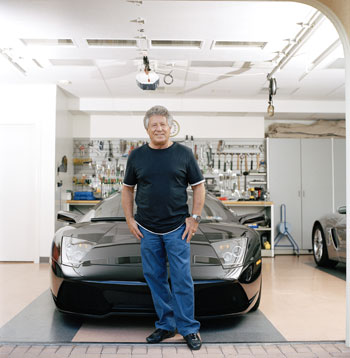
Andretti: That must be my black Lamborghini Murciélago.
Why don’t you own a Ferrari? You won your first Formula One race in a Ferrari.
Andretti: Lamborghinis are better than Ferraris. Besides, they gave me a better deal.
I’m a decent driver, never had an accident. Why will you always be faster than I am?
Andretti: It’s a combination of desire, passion and a lot of work. Some people see the work as sacrifice. But for me it was just enjoyment. I derived so much satisfaction from a good result. Each good result made me want more.
So it’s all about winning. In your career you’ve won over 100 races in many different series. How important was it to be the leader of the pack?
Andretti: It was the all-important aspect. I could not remain motivated by just racing. Once I knew I would not be able to win anymore, I retired. I didn’t want to have a lasting memory that I was not competitive.
One also earns good money being third, fifth or 10th. Why did you need to win?
Andretti: It’s a matter of pride. To me, winning is the ultimate satisfaction. I don’t want to be arrogant, but I detest mediocrity. If you settle for less than winning, you’re just mediocre. You’re not going to win all the races. But you know what? That has to be the ultimate goal.
You’re considered one of the greatest racers ever. But even a mediocre racer earns way more money today than what you made back in your days. Were you great at the wrong time?
Andretti: Yeah, for sure. And I’m a bit envious. But the money is the wrong motive. I was always one of the best-paid racers. A big contract justified the risk to my family. But with a very soft breath, I would say I would have probably raced for free. Nobody needs to know this. I loved it so much. I didn’t want to do anything else.
You had your greatest successes in Formula One in the ’70s. Today’s Formula One is more commercial. Is it better?
Andretti: Probably not. But I have no problem with all sports being more commercialized. Athletes have a very short lifespan in sports. Considering the risks and the sacrifices they make, there is nothing wrong with trying to earn a comfortable living. When the mortality rate was much higher (in racing), I’d seen many friends dying, leaving their families with nothing.
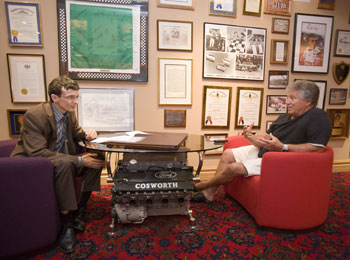
Andretti: First was the love for what I was doing. But I always felt that nothing comes without a price. I was willing to put my life on the line. I had enough confidence that I would not make a mistake that would kill me. The only danger I faced was an equipment failure, or getting caught up in somebody else’s mistake. It was a calculated risk. So I accepted it.
Niki Lauda once said a racer needs to be driving by the seat of his pants. Do you agree?
Andretti: If you don’t drive that way, you’re going to crash. It means that you’re disregarding what you feel and that should never be the case. You can never second-guess yourself.
Together with Jackie Stewart and Lauda you were a safety proponent…
Andretti: … We started the movement to put emphasis on safety. We thought if we’re this clever that we’re making these cars faster every year we should use this same knowledge to make them safer.
Have you succeeded?
Andretti: We succeeded tremendously. But it’s still a work in progress. It never ends. One thing is for sure: The sport of motor racing would not exist today if the mortality rate were to continue like we experienced it back then.
Why is that?
Andretti: The only way the sport can have a future is to have solid commercial backing. Companies will not spend millions of dollars to be part of a sport and then go to funerals. They want to celebrate. When I was in Formula One, we had to accept death. It was the nature of the beast.
You lost friends and teammates. How does one cope with that?
Andretti: There’s nothing worse. Things are never the same. You suffer through it. But then you say, “I must go on. Life must go on.” You have to tell yourself, “That’s not going to happen to me.” Otherwise you don’t exist and you can just pack up.
Michael Schumacher had his cars built exactly for his needs. Other drivers take the best out of any car. How involved were you developing your Formula One car?
Andretti: I wanted to understand the technical side as much as possible. A car’s an animal. You can always tweak it. You can do this and that to make it better. The closer I get to the sweet spot of a car, the easier it is for me to drive it, and to drive it fast.
Would you find the sweet spot on the road? Or were your cars built so you’d find it blind?
Andretti: I was trying to have the car set up a little closer to the sweet spot so I could drive it at a limit. That gave me the confidence going in. Confidence is very, very important. To know that I have a better race car than anybody else was hugely important to me.
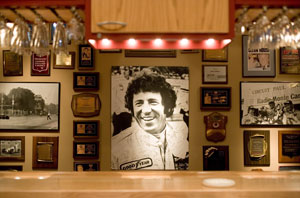
Andretti: Yeah, either at the pit stop, or even in qualifying. There was so much parity with cars. That means that the minute you’re loading up for that weekend, everything you do will make a difference. It’s not too bad to have that sort of pressure.
You won the Formula One World Championship in 1978. Still, the series never really took off in the US. Why?
Andretti: Very few US drivers have been successful in Formula One. I was only the second American World Champion. Here, the sport falls short of being the talk at the water cooler. But if we’d have another winning American with Ferrari or McLaren you might see an incredible surge in interest in America.
Could that driver be another Andretti?
Andretti: I hope it will be Marco. If I were to design a Formula One driver, I would design Marco Andretti. I’m not just saying this because he’s my grandson. I just see his approach, how quickly he learns things, how he adapts. He’s very good.
You saw your son getting into racing. Now it’s your grandson. What’s it like to stand on the sidelines?
Andretti: I’m always very nervous. I know exactly what they’re facing. But it is their choice to race. I never told them to get in. Actually, in many ways, I discouraged it. Of course, I never told them outright not to do it. That would be highly hypocritical. I just told them, “Don’t do it for me. Only do it for yourself.”
For years you were competing against your son Michael in the Indy Car series. How was that like?
Andretti: It was one of the best times in my career. We both really wanted to win. Of course, it was a bit unfair. I was on the way out. He was at the top of his game. For me, the competition was sort of a measuring stick for me. I must admit it kept me in the game a bit longer.
Who beat whom more often?
Andretti: At the beginning, I was beating him more. When we were on the same team, he won more often.
How did you react when you were winning?
Andretti: I was happy as hell to beat him. We had this basic, but unwritten understanding that we’d really go for it. I said, “Don’t do me any favors and I won’t do you any.” We did a little bit of wheel rubbing. But it would never be anything that I knew could hurt him. He wouldn’t do anything that would jeopardize my safety either. We beat each other honestly.
Besides a couple of broken bones, you never really got hurt. Why’s that?
Andretti: I only missed two races in my life because of injury. It’s because of the man upstairs. I have a lot of faith. It is the force behind me. And I’ve been fortunate.
You and your family left your birthplace in Italy after it was taken over by Yugoslavia. In 1955, you were 15 years old when you arrived in the US. What went through your head when you sailed into New York harbor?
Andretti: It was 5 o’clock in the morning, a beautiful, clear summer day. It was my sister’s 21st birthday. We were sailing right below the Statue of Liberty. It was just a great view, a good feeling. I was thinking, “No more war, no more camp, we should have a normal life now.”
Like many other immigrants to the US you’ve become very successful. Why do immigrants often do well?
Andretti: As an immigrant you’re more driven. When we came, my dad had just 150 dollars to his name. Now we had a new life in a land of opportunities. I developed my passion for motor racing back in Italy. When we arrived here in Nazareth we heard the noise of the racetrack. We didn’t have any money. So my twin brother Aldo and I began building our own race car. It was done when we were 19.
The legal age for racing was 21.
Andretti: We worked at a gas station and filled up the car of Les Young, the editor of the local newspaper. We asked him to fudge the ages of our licenses.
You drove your first race with a fake driver’s license?
Andretti: Yeah. We had one car and two drivers, my brother and I. Though we started out last, we won.
A great career followed. What do you consider yourself today, an American or an Italian?
Andretti: My passport will never change my blood. I’m thankful for what America has provided for us. I lived the greatest part of my life in this country. I’m a US citizen, but I’m still Italian.
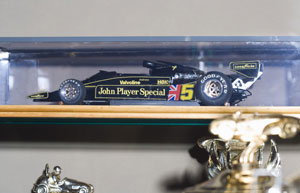
Andretti: All the good things. The last time I was in a Formula One car was also a Ferrari, substituting for Didier Pironi at Monza. If there is one thing that I regret in my career, it’s that I never did a full season for Ferrari in Formula One.
When you go to Italy today, do they consider you one of them, or as one who left them behind?
Andretti: Most people recognize me as a racer. They know me as an American. But there’s always a big and pleasant surprise when we start talking. First they struggle with their English and then I answer in Italian. “Oh, parla italiano?” they ask. It changes everything. I’m one of them immediately.
You’re now 67. You raced until you were 60. Many times you came back from retirement. Why did you stay in so long?
Andretti: Because I loved it. I simply love it. I just did. I am only truly happy in a race car.
One needs to be rather fit to stay in the game so long. Michael Schumacher traveled with a personal coach. Some racers train in the boxing ring, others hit the nautilus room. What did you do?
Andretti: I didn’t need a trainer because I’d raced a lot more than the guys do today. If you only race 16 or 17 races you need to train. I used to race 35, 40 or 51 races in one season. There were days when I had three races, one in the morning, one for lunch and one in the afternoon. Why would I need training? I needed to rest in between. I was always in a race car. I did not need the gym.
Who do you consider the best racer ever?
Andretti: If you look at the record, it’d be Michael Schumacher in Formula One. Nobody can dispute that. But then again, you need to look at his reliability record. If I’ve had a streak of 74 races without mechanical failure, I’d have had a similar record. I was leading many races in which the cars later broke down.
Let’s leave the records aside. Who’s the best driver who’s ever entered a race car?
Andretti: I refrain from naming a specific person because I think it’s impossible to evaluate it. I’ve seen many drivers judge other drivers, and I find that to be a bit controversial.
Racing is a fast-paced business. There is lots of money, there are many good-looking women, and there is temptation and craziness. You’ve been married for 46 years. How did you stay sane?
Andretti: We’re all human, and there are many temptations. But I also know what is important for me. My wife is very solid. She maintained stability. I got the same welcome whether I came home with a trophy or not. My son Michael is on his third wife. There’s a reason. When he would win, boy, they had balloons and everything all over the house. I’d say to his wife, “Why do you do this?” “We’re celebrating,” she’d answer. “So, what do you do next week when he doesn’t win?” I told her, “We’re in a business. It should be the same thing. He should get the same kiss, the same embrace, whether he wins or not.” My wife provided that.
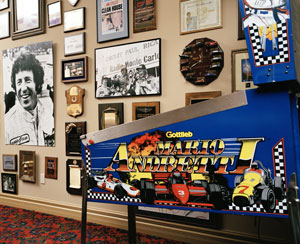
Andretti: I use the same formula. I surround myself with people that are smarter than I am. That’s the way you will always succeed. I never profess to be what I’m not. I’m in the wine business, which is just a lot of satisfaction and fun. A lot of people say, “Oh, Mario, the winemaker.” No, thank God, I’m not the winemaker. I have a winemaker – one of the best in the business.
You have a successful petroleum business, a racing school, or you license your name to a Chinese scooter. Why don’t you just sit in Florida and play golf?
Andretti: I get bored very quickly. One of my favorite saying is, “Do whatever melts your butter,” or whatever makes you feel good inside. Working gives me a sense of purpose and it makes me feel good.
It also made you a rich man. What does money mean to you?
Andretti: Security. I was once asked, “What do you fear most in life?” I said, “To be poor.”
When I prepared for this interview, somebody told me, “Mario Andretti never has a bad day.” How come?
Andretti: It’s a matter of really looking at life in a positive way. I’m the eternal optimist. There is always hope for something good somewhere.
Mario Andretti’s Thoughts on Other Legends
Enzo Ferrari 1898–1988, founder of Ferrari car manufacturer: “Enzo Ferrari is the icon of all icons in our sport. The legacy that that man has left is there for the rest of time. You mention Ferrari and anyone in this world, I don’t care where you go, will know exactly what he stood for. He is one of the personalities in our sport that could never, ever be duplicated.”
Paul Newman born 1925, actor, race car driver and race team owner: “Loyal, great friend. Just a good, solid, honest man. I first met Paul back in 1966. I think I’m a little bit responsible for having him really pursue motor racing. Then later on, obviously, when I drove for him back in 1983, I am the one that brought him together with Carl Haas, his partner.”
Clay Regazzoni 1939–2006, Formula One driver, winning five Grand Prix: “Good friend. Clay was one of those individuals that really signified the perfect example of good camaraderie among friends. He was everybody’s friend. Very great to be with. You know, obviously I’m a bit prejudiced, because he and I were good friends. But in general, everybody loved Clay. He was a driver that certainly has done tremendous in his career.”
Niki Lauda born 1949, Formula One driver and three times World Champion: “Very solid. Wonderful, very worthy World Champion. Very great technical driver. What I like about Niki is that there was never any bull. He was very straightforward. He says it like it is. I think he’s one of the most honest men that I’ve ever met. And I have great respect and admiration for him.”

It would be an honor for me to spend time in the home of Mr. Mario Andretti. I have been a fan of his since I was a kid. I have great respect for his work ethic and accomplihments in the world of motor racing.
I echo your words….”I have been a fan of his since I was a kid. I have great respect for his work ethic and accomplihments in the world of motor racing”
I also come from a racing family and can remember as a kid watching Mario Andretti on TV. My family would huddle around the tv and watch the Indy 500. Today my mom and dad are gone and now my son and l talk and watch the racing on tv and travel to Daytona to see the races. He now at the age of 24 is deeply involved with motorcycle racing and loves to hear the stories of the older reacing drivers like Mario Andretti. Would love to meet him.